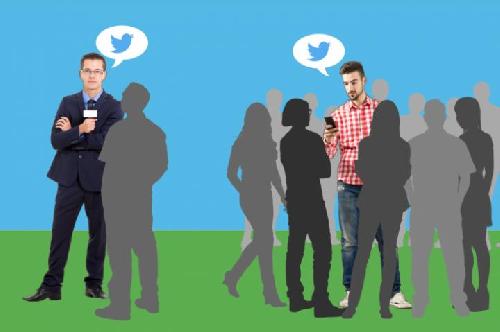The fatal shooting of Michael Brown on Aug. 9, 2014, in Ferguson, Missouri, set off a national wave of dialogue and protests, from the streets to social media, as people nationwide grappled with myriad complex issues, including police use of force, race relations in America, and criminal justice reform.
Now, new research from two Northeastern University professors shows that in the days following Brown's shooting, everyday citizens--not politicians, celebrities, or other prominent public figures--were the ones who, using Twitter, shaped the national conversation. African Americans with close ties to the Ferguson area, they found, played a particularly influential role on the day of the incident.
Sarah Jackson and Brooke Foucault Welles, both assistant professors of communication studies in the College of Arts, Media and Design, examined 535,794 tweets from Aug. 9 to Aug. 15, 2014, that included the word or hashtag "Ferguson." They identified the top 10 tweets each day that were most retweeted or mentioned and then analyzed how these Twitters users--who they described as "early initiators" and "crowdsourced elites"--drove the discussion in the days following Brown's killing.

Twitter, they argued, catalyzed the national response. The first week of "Ferguson" tweets, from the time of Brown's death up until the national media coverage and President Barack Obama's public address--illustrated the power of social media to allow everyday citizens, particularly those in marginalized groups, to influence larger public debates, they said.
The research was published online in the journal Information, Communication & Society on Dec. 29.
Jackson and Welles noted that on the first day the most influential person was an African American woman from Michael Brown's neighborhood using the Twitter handle @AyoMissDarkSkin, who had two-and-a-half times more retweets and mentions than the next closest Twitter user. They noted that she described Brown as "unarmed" and as having been "executed" by Ferguson police, who "shot him 10 times smh." In their paper, the researchers contrasted this tweet with another from The St. Louis Post-Dispatch (@stltoday), which reported "Fatal shooting by Ferguson police prompts mob reaction."
The woman's tweet, they noted, was sent within minutes of the shooting. It garnered 3,500 retweets before "Ferguson" or "#Ferguson" became widely used and was retweeted or mentioned three times more than the newspaper's tweet.
"How she tells the story in that tweet sets the tone for how the story is framed in many of the rest of the tweets about it," Jackson said. "From my perspective, what's significant is that Twitter can allow everyday people who otherwise have little social or political power to shape a narrative about their experiences and what matters about those experiences."
Here are some of their findings:
- On that first day, Aug. 9, all but one of the top 10 early initiators were African Americans with personal connections to the Ferguson area. "What is notable about this group of initiators is the centrality of black voices," Jackson and Welles wrote. "In fact, @stltoday is the only account that does not directly reflect an African American voice or target an African American audience."
- Of the first-day initiators, only one--Antonio French, a St. Louis-based alderman whose district borders Ferguson--was among the "crowdsourced elites" in the following six days. Meanwhile, these elites came to include activist collectives like Anonymous, bloggers, and tweeters without personal connections to the area as well as more local and mainstream news sources.
- African American community members appeared among the crowdsourced elites for the entire week, even in the face of increasing competition. Jackson and Welles pointed to one "elite," a St. Louis-based college student, @Nettaaaaaaaa, who was among the most widely retweeted and who later became well-known in the #BlackLivesMatter movement. Another, @natedrug, tweeted from within the ranks of the Ferguson protesters, though this user has kept a much lower profile since then.
- National mainstream news organizations played a minimal role in the network, with only one--CNN--gaining elite status on the last day of the first week. "Instead," the researchers wrote, "the most visible media throughout the first week of the Ferguson network were mainstream local outlets and photographers and mainstream national journalists."
- Beyond journalists, few political or entertainment figures achieved elite status in that first week. The only politicians' Twitter handles that appeared were President Obama and Missouri Gov. Jay Nixon, and only "because so many Twitter users were tweeting at them with various pleas and criticism about the events unfolding there."
Jackson and Welles explained that they focused on the first few days of Twitter activity in order to understand who the early influencers shaping the narrative were, rather than who became the most influential over the long term.
As Welles put it, looking at a larger time period "tells us who becomes influential once something is a national news story, but it doesn't tell us why certain things become national news stories and how those stories get told from the get-go."
Jackson's research centers on how social and political identities are debated in the public sphere, with a particular focus on how race and gender are constructed in national debates on citizenship, inequality, and social movements. Welles--a member of Northeastern's Network Science Institute and NU Lab for Texts, Maps and Networks--studies how social networks shape and constrain human behavior.
The Ferguson project builds upon their previous work on hashtag activism. In a paper published in November 2015, the professors examined how Twitter users hijacked the hashtag "myNYPD" following a police department public relations campaign, using it instead to promote counterpublic narratives of racial profiling and police misconduct.
"That paper spurred our move to this research," Jackson said. "We found that Twitter allows everyday citizens to influence public conversation. Everyone saw how Ferguson unfolded and how social media drove that story, so we wanted to see if what we observed before was also the case here too."






Comments